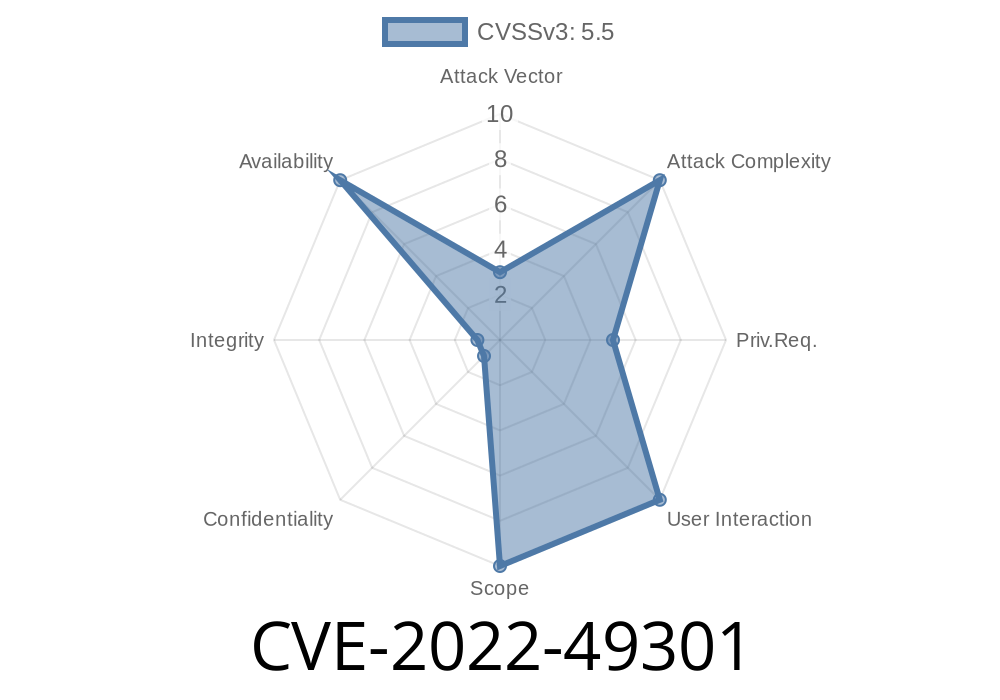CVE-2022-49301 is a recently resolved vulnerability found in the Linux kernel, specifically affecting the driver code for certain Realtek USB Wi-Fi adapters (drivers/staging/rtl8712). The bug involved the *use of uninitialized memory* when an internal USB control function failed. If left unpatched, this could potentially lead to erratic driver behavior, data disclosure, or even kernel crashes, threatening system reliability and security.
In this article, we’ll walk through what caused this bug, how it could be exploited (with simple code snippets), and where to find the original sources.
The rtl8712 driver is used for some Realtek USB Wi-Fi chips.
- The function usb_read8() and similar functions (for 16 and 32 bits) request bytes from the device using a helper, r8712_usbctrl_vendorreq().
- If that helper returned a negative value (indicating a failure), the local variable where the result was supposed to go (e.g., data) was not set.
Later, code read from this uninitialized variable, resulting in undefined behavior.
Tools like KMSAN (Kernel Memory Sanitizer), which catch use-of-uninitialized-value bugs, caught this in-the-wild.
Relevant Upstream Bug Report
See the syzkaller bug report for full details.
Let’s look at a cut-down version of the problematic code in usb_ops.c from the driver
// Simplified example from drivers/staging/rtl8712/usb_ops.c
int r8712_usbctrl_vendorreq(..., void *data, ...) {
// returns < on error
}
u8 usb_read8(struct intf_hdl *pintfhdl, u32 addr)
{
u8 data;
int status;
status = r8712_usbctrl_vendorreq(..., &data, ...);
// Oops! If status < , 'data' is unset.
return data; // Could be ANYTHING!
}
Problem: If r8712_usbctrl_vendorreq() returns a negative error code, the value of data is indeterminate (whatever was in that memory location before). When the caller uses it, it may process garbage—possibly leaking bits of kernel memory, or causing unpredictable behavior.
How Could This Be Exploited?
While a regular user can’t usually trigger driver reads directly, *attackers with access to a USB device*—or using a virtual machine passthrough—could try to force the failure of these USB handler functions in a way that the kernel leaks past memory contents.
Possible exploitation scenarios
- Information Disclosure: Uninitialized kernel stack data could be returned to userspace or used in logs, leaking secrets.
- Crashes/Instability: Garbage data could cause corrupted driver state, leading to crashes or lockups.
- Local Privesc: Combined with other bugs, there’s a potential for privilege escalation, though not directly via this bug.
Here’s a simple demonstration of what might go wrong, in principle (not a working exploit)
// Simulated vulnerable path:
u8 val = usb_read8(...); // val is garbage on vendorreq failure
printk("Read value: %02x\n", val); // May leak kernel memory content
How Was It Fixed?
The fix is very simple: clear or set a default value for data on vendor request failure.
Patched code
u8 usb_read8(struct intf_hdl *pintfhdl, u32 addr)
{
u8 data = ; // <-- safe default
int status;
status = r8712_usbctrl_vendorreq(..., &data, ...);
if (status < )
data = ; // or error-specific default
return data;
}
References
- The actual patch as submitted
- syzkaller report
## What Drivers/Systems Are Affected?
- Only kernels with the affected driver (drivers/staging/rtl8712) are vulnerable.
Update your kernel: Get a version with the patch (after Jan 2023).
- Disable driver: If you don’t use Realtek 8712 USB Wi-Fi, disable CONFIG_STAGING_RTL8712 in your kernel configuration.
Uninitialized memory bugs can be subtle but dangerous—especially in kernel code.
- Security tools like KMSAN and fuzzers like syzkaller are essential for finding these issues, even in “niche” or staging drivers.
References & Further Reading
- syzkaller bug report (CVE-2022-49301)
- Commit in Linux kernel Git tree (fix)
- KMSAN Documentation
TL;DR: *If you rely on old Realtek USB Wi-Fi hardware, upgrade your kernel now to avoid data leaks or crashes from this driver bug (CVE-2022-49301)!*
Timeline
Published on: 02/26/2025 07:01:06 UTC
Last modified on: 04/14/2025 20:08:57 UTC
